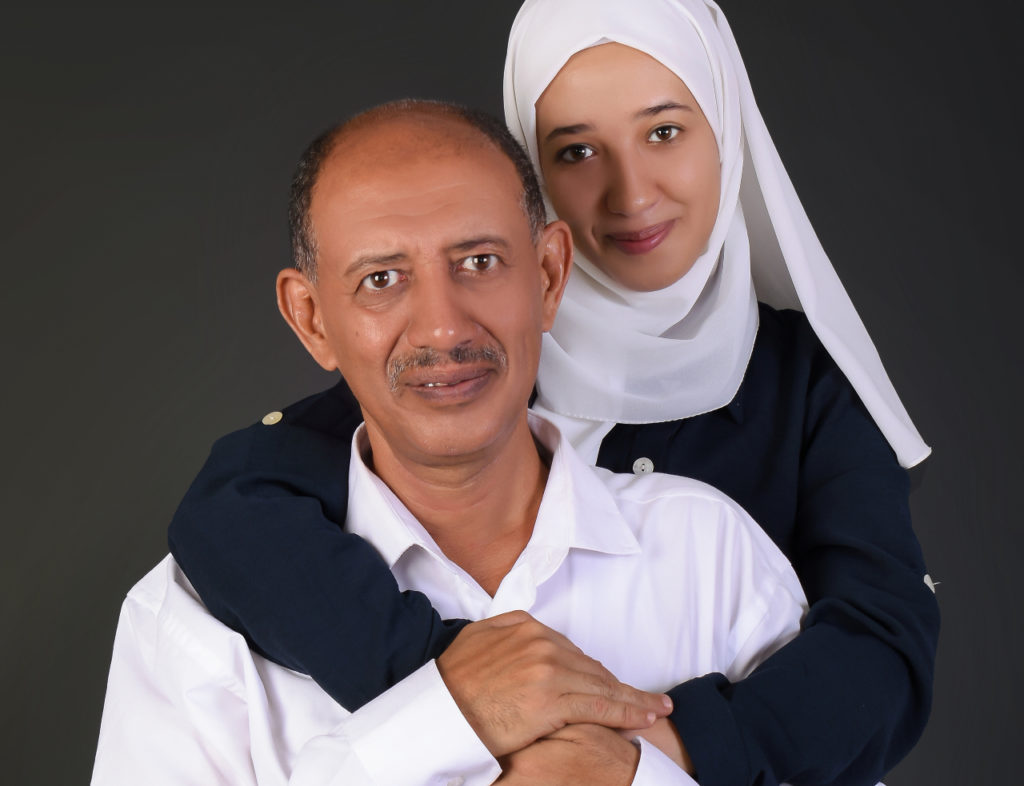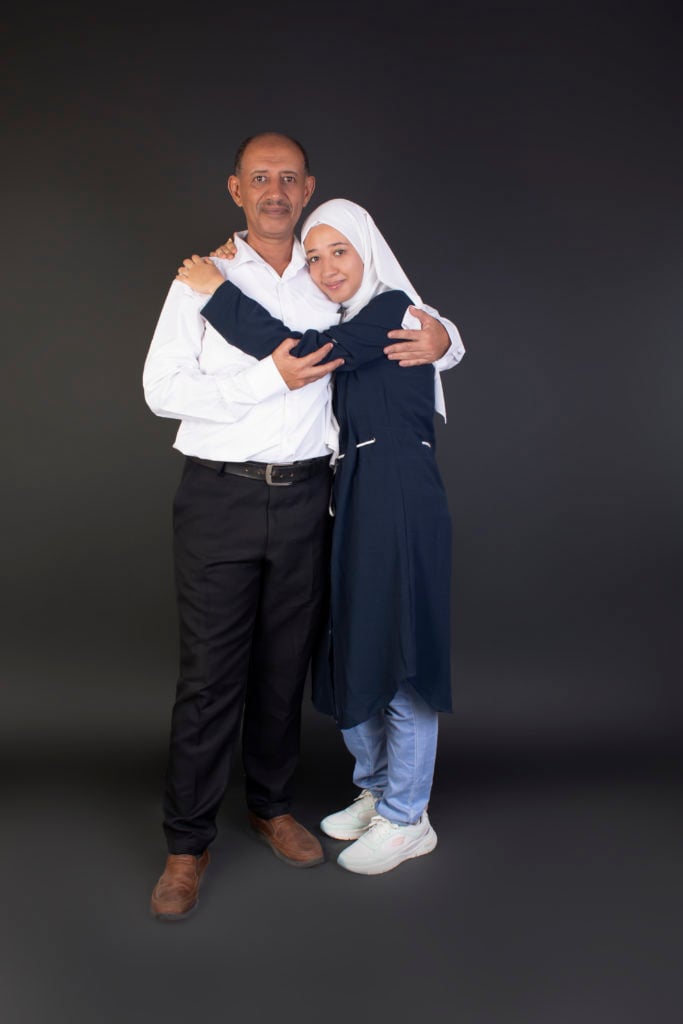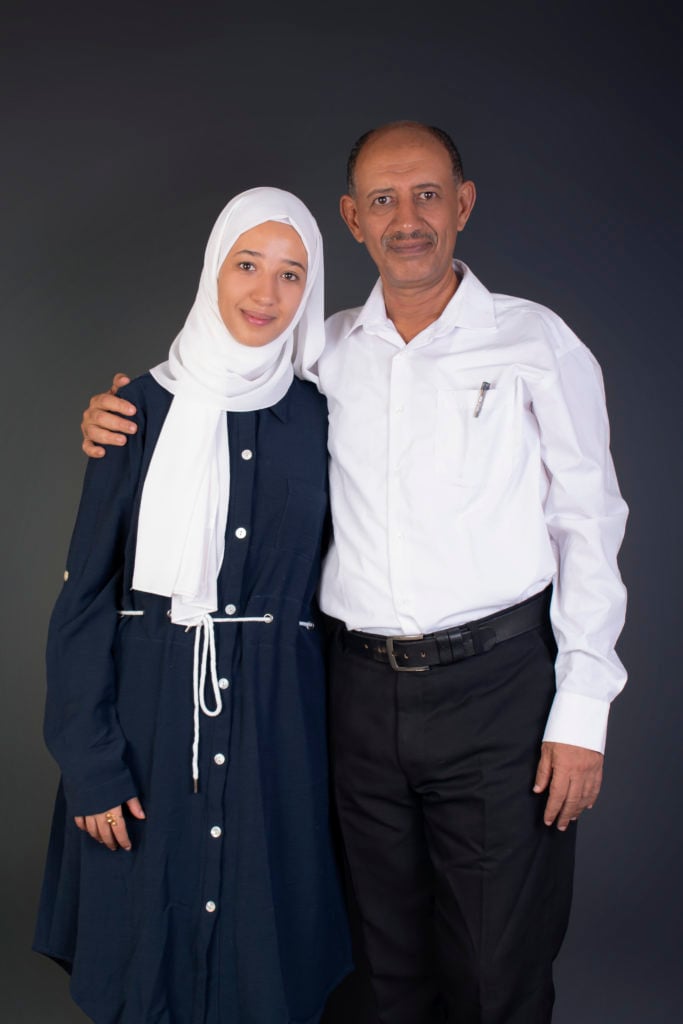How do different generations in one family look at peace? On the International Day of Peace, we invite you to listen to Olla, a pacifist, social activist, and student when war breaks out in Yemen, and her father, Waleed, who works in the army. “I don’t have the hope you still have, Dad.”

In 2014, when Olla Al Sakkaf was 20, everything that could go wrong went wrong. The dark clouds that had been amassing over Yemen suddenly burst.
For a while, though, during the 2011 revolution, when young people rallied en masse against state corruption and unemployment, better times seemed to be ahead. Spring was in the air. But instead of a peaceful power transfer after President Saleh is ousted, the revolution degenerates into horror. Saudi Arabia, the US, and Iran enter the scene. They fuel the conflict into a full-blown international war. Shia Houthi rebels captured the capital, Sana’a. Al Qaeda and other terrorist groups gain a foothold.
Yemen, a patchwork of strongholds
In the past eight years, Yemen’s proxy war has turned the country into a patchwork of proto-state entities, front lines, and checkpoints, on which the world’s largest humanitarian crisis is unfolding.
In the middle of that patchwork lies the besieged and cut off city of Taiz. This is where Olla and Waleed Al Sakkaf live. Or try to live.
Miraculously, during the war, Olla obtained her university degree in English Literature at Taiz University. And though she could read Dickens, Hardy, or Eliot all day, she spends her days differently. She joins YWBOD. This Yemeni partner of the Cordaid-coordinated Civil Society Platform for Peacebuilding and Statebuilding (CSPPS) works on youth empowerment and peacebuilding in Yemen. It also provides relief aid. Olla and other people her age collect and distribute supplies for hospitals and schools.
“Arms are everywhere, rule of law is nowhere. Any day could be your last. You can hardly call this a state. Or a society.”
For some time, as a volunteer with Deeproot’s Youth Mediation Support Team, Olla is involved in mediation efforts to end the siege on Taiz. The team also gathers and provides data on people that have been arrested, were taken hostage, or disappeared otherwise in Taiz.
To this day, Olla tutors children and conducts peacebuilding training sessions and workshops for grown-ups, also in very insecure areas.
Vocal in a country where women are silenced
Online, by the grace of a flimsy Internet connection, Olla becomes an international spokesperson for her generation. In 2020, as a representative of the United Network of Young Peacebuilders (UNOY), she even addressed the UN Security Council.
Recently, she set up her foundation, Peace Environment. For her, it’s a vehicle to promote peace and education and tackle the climate crisis in her country. In recent years, Yemen experienced unprecedented flooding in its desert areas.
Her father, Waleed, 59, studied military and political science in Moscow and worked for the army in Taiz. At the start of the war, he still participated in armed military operations. Nowadays, he has an administrative job. He has another daughter and one son in addition to Olla.
Olla is a peace and climate activist in a war-torn city. Daughter of a military man. Young, outspoken, and vocal in a country where women and young people are silenced. “I am who I am, thanks to my father.”

Let’s listen to a very special conversation between a daughter and father in a besieged city. We have put Olla’s words in italics to keep track of who is speaking.
Peace, what does it mean?
Dad, what does peace mean to you?
Salaam…for me, that means stability. All can live a stable existence, study, have medical care when needed, have a roof over their heads, support their families and meet basic needs. All that is gone. Arms are everywhere, rule of law is nowhere. Any day could be your last. The economy has collapsed, and there is no government, governance, or control. Salaries are not paid, and prices go up every day. You can hardly call this a state. Or a society.
How was it before, when you were my age?
You had corrupt leaders, and there was unrest. Civil society activism did exist but on a small scale. The big difference is that there was no war then. Now, every sector of society is pretty much destroyed, and corruption is everywhere. On the other hand, a lot more people now stand up for peace, human rights, and gender equity—for change—like you do.
You are a dreamer; you are a survivor
What do you think about me and what I’m doing?
I am proud of you. You are a dreamer, someone who pursues visions. And who simultaneously does everything to help others and make society more liveable. You are a go-getter with a lot of abilities. That’s why, even in this besieged city, you get your degree, work your way up, and carve your way forward. You are a survivor. Even when you were a kid, you had a personality. I could see you were destined for bigger things. That’s why I was so eager for you to go to college.
I am also a woman. What do you think about women being so discriminated against in Yemen?
I abhor it. Men who favour their sons and discriminate against women in the name of their religion confuse Islam with harmful traditions. Women make up more than half of society. If they cannot develop to their full potential and pursue their dreams, it will be to the detriment of society as a whole.
And how do you look at me as a father?
Maybe it’s weird to say this to you now, but since childhood, you have been my hero and my example. In Arab countries, fathers often favour their sons. You never did that. You always supported me, no matter what it took or what I wanted to do. I never felt inferior to my brother.
You never burdened us with your worries
You work hard to provide for your family and to give us opportunities. The war is perhaps even more difficult for you than for me. You have responsibilities I don’t have. When you didn’t receive a salary for years, you still managed to take care of us. When the bombs fell, and we had to flee our home, you found a new place for us. You never burdened us with your worries as head of the family. Now that I have a job and can earn something, I am glad I can contribute to the family’s income.
“I look at it differently. This war has destroyed us. It has killed every ounce of creativity in people.”
Today, I consider you mostly a friend. And an inspiration to continue doing what I do. Few women and girls I know have that kind of relationship with their fathers.
By the way, just because you are my hero doesn’t mean I always agree. On the contrary, the older I get, the more often I disagree with you. Just as well because I am rather stubborn.
You think, ‘How nice, these rains’, I think, ‘Help!’
Can you give an example?
Take the climate crisis. You think: ‘How nice, these rains in the desert, never seen before. They could turn the country into a green oasis. Whereas I think ‘Help!’. I know that extreme weather is going to be disastrous. And that if we do nothing, whole villages will be wiped out.
You have experienced much more than I have, yet you are more hopeful than I am. You are hopeful even when you look at the conflict and its resolution.
That’s true. Your lack of hope makes you vulnerable. As a father, it hurts to see that. I have experienced crises before. I know that after a period of fighting among themselves, Yemenis unite again. The most important thing is to have a leader who can unite people. When that happens, this country can rise out of the ashes. I believe that will happen.
The wounds of war
I look at it differently. Things are only getting more complicated. Things get worse. This war has destroyed us. It has killed every ounce of creativity in people. Even children don’t dream anymore. People are killing each other for nothing. Everyone is mutilated inside, traumatised by the war.
Only when the war ends will we see the depth of the damage done. That’s when the real work begins. How can we, torn apart and inside, work out a new future if we don’t face and deal with our traumas first? Everyone in this country, including me, needs professional psychological care to be able to bear the suffering of war and to move forward again. How can a generation that knows only war, has not been able to study, and does not know what peace is rebuild the country?
Of course, the scars and wounds of war are deep in all of us. But as a country, you can rise. Look at Rwanda, which, after the horrific genocide in ’94, managed to develop itself at a rapid pace. Under the leadership of President Kagame, it has become a stable and prosperous country. Or look at how, after his release, Mandela piloted South Africa into a new future without civil war.
When I’m at my wit’s end
True peace will not come with leadership alone. I do not look at political solutions but at the fabric of society. The wounds must heal in each of us. And getting guns and brutal violence out of our system, as a people, as a country, will take decades.
“Every time you went out to look for water or food somewhere, I was left alone. With a gun in my hand.”
Anyway, I see that you are more hopeful than I am. And even though I don’t share your vision, it sometimes inspires me. When I am at my wit’s end and feel down, it gives me energy knowing that you trust things will get better.
Overprotection of parents really is an issue
For my work, I also travel to places outside the city, including Houthi territory. Sometimes, that’s quite dangerous. How do you deal with that?
Eight years of war have accustomed us to many things, including insecurity. But still, it’s difficult when it concerns your child. If I don’t trust things, I accompany you. I’ll act as your bodyguard. I know you don’t always like that. The other day, I handed you a bottle of water during your workshop because I thought you weren’t drinking enough. You found that embarrassing. A woman, 28, in a leading role, with her dad by her side.
That’s true! I understand your concern. But overprotection by parents really is an issue. It makes it harder for young people to go their own way, find their place, and conquer their position. Fortunately, you and Mom alternate. Because of your job with the army, there’s no way you can enter Houthi territory. I do go there, sometimes accompanied by Mom. Then, she’s my bodyguard.
And I want to mention that I am behind the wheel at least half the time.
Remember that month, when everyone had fled?
By the way, as a daughter, I worry about you too.
You do?
Yes, of course. It was so frightening, especially at the beginning of the war. At that time, you were still taking part in armed operations. Every time you went to the frontline, we were scared to death. You were on the border with Saudi Arabia for a while then. Sometimes, we couldn’t reach you for a few days. Fortunately, later on, you got an administrative job. No more fighting.

Remember how, when the war started and everyone fled from Taiz, we stayed together in our house—just the two of us—for a month? Every time you went out to look for water or food somewhere, I was left alone, with a gun in my hand, in case someone attacked our house.
Of course, I remember. So there you go; we all worry about each other.
At least you stayed close to your principles
We talked a lot about my social work. But do you know that you are also working for peace for me in your own way? Even with your work in the military. And that comes from a pacifist who believes you can never achieve real peace with weapons.
How would I be doing that?
First, by being a father and a husband who teaches his family the principle of equality. And by encouraging us in what we do. But also indirectly, through your work in the army. Even if you now have a purely administrative job in the military, you work with young soldiers. Often, they are treated as mere instruments of war. You teach them to think for themselves and to look at the social and historical context of the situation they are in. And not follow orders like an automaton. This explains why they haven’t made you a general, of course. But at least you always stayed close to your principles.
By the way, when you said a good leader could unite the country and move it forward… Could that also be a woman?
Then again, you can’t make peace by fighting
Sure. But I don’t see one right now. In fact, male or female, that leader is not in sight right now. But I’ll vote for her when elections come, and she’s on the list. And if someone asks me if I could become that female leader of the country, my answer is: I hope not. To play that role, you have to be able to negotiate. You can do that. But you also have to be able to fight and confront. And that’s not in your nature.
That’s true; fighting is not my nature. But then again, you can’t make peace by fighting.
I know peace in this country will have to come from your generation. My generation is nearing sixty. We are not the future. You asked me at the beginning what peace means to me. Much more important is your answer to that question. What is peace to you, my dear Olla?
Peace is life. Without peace, I cannot live. I can breathe, eat, and sleep, but I cannot live. I will live and have my life back when there is peace.
All images: © Olla Al Sakkaf